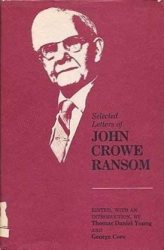In my lengthy, involuntary exile, I was remiss in not linking to an excellent reminiscence of Henry Reed's time as a professor at the University of Washington, Seattle, between 1963 and 1967. Ed, over at
I Witness (appropriately enough), has two spectacular posts from October last year, recounting his days as an English major and teaching assistant in Seattle, and how Reed came to befriend him and his family.
Part one, "
Henry Reed in Seattle," tells the story of how Reed came to be invited to teach at the University of Washington, and features a cameo appearance by the poet Theodore Roethke. The second part, "
Typography of the Heart," has tea with Elizabeth Bishop, the occasional opera, and Reed's eventual return to England.
I, myself, have been trying to remember precisely when I first discovered Henry Reed. It was his "Naming of Parts," of course. It was in high school, inside a giant, all-encompassing
Norton Anthology we had to purchase for sophomore year. My copy was used, well-used, with the notes of various previous owners in the margins in pen and pencil, passages underlined. The pages were onion-skin thin, almost transparent, and it seemed like every single page could be peeled to reveal another, like Borges' infinite library book.
We didn't even read "Naming of Parts" in class. I would read ahead whenever I was bored with whomever we were covering: Homer, Conrad, Eliot. I remember reading Auden's "
Musée des Beaux Arts," distinctly. It was the first truly modern poem I had been introduced to, and I was staggered that I could learn something so profound from (and about) a painting I had never seen, Brueghel's "
Landscape with the Fall of Icarus." Just a few pages beyond Auden was Henry Reed. Anytime I wrote poetry for a creative writing class in the years that followed, I was imitating either Auden, or "Naming of Parts."
It would be ten years before I would look Henry Reed up, again. I had a part-time job at the reference desk of my local public library, and I spent my shifts answering the oddest questions from our patrons, like "Where can I find a list of all the times the word 'breast' appears in The Bible?" After a while I knew enough about how the library worked and how the books were organized to try and answer some of my own questions.
There was nothing about Reed online in those days. Most of the library's databases were still on CD-Rom. In Louis Untermeyer's anthology,
Modern American and British Poetry, I learned there were two more poems to Reed's
Lessons of the War: "Judging Distances," and "Unarmed Combat." There was also a long, long poem called "The Auction Sale." I must have known that Reed had written other poems, but I hadn't been prepared to find two sequels to "Naming of Parts," and certainly nothing as good as "Judging Distances."
And it would be a few more years before I would learn of Reed's death, after I had taken a job at a university library. There, it was easy enough to go to the Reference section—so much more comprehensive than the one at my old public library—and look him up. So I finally found out that Reed had died back in 1986, about the same time I first read "Naming of Parts." But there are biographies in the reference sections of many libraries which haven't been updated since before Reed died, and several printed since which failed to notice his passing, and you can still find him listed in the subject headings of library catalogs online with a heartening
Reed, Henry, 1914 - .









